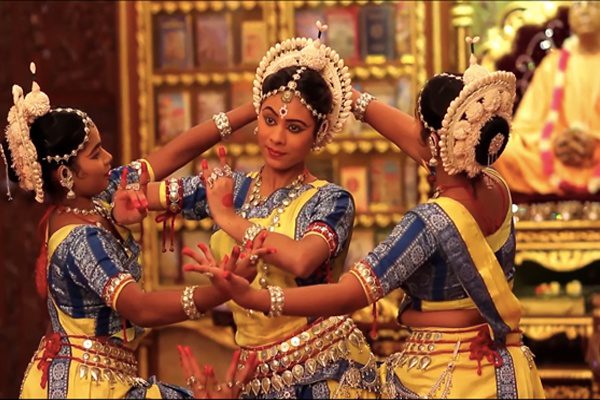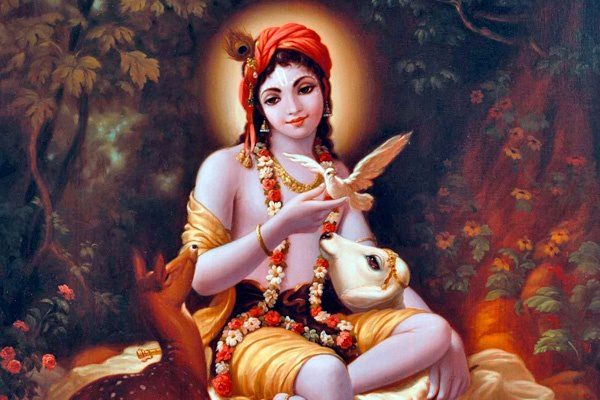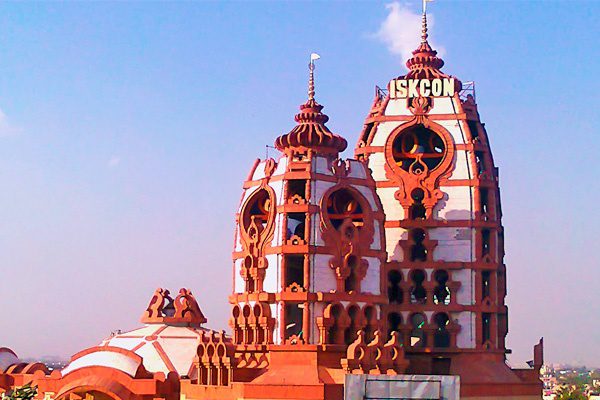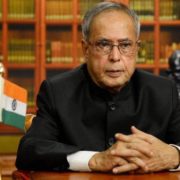
INTERNATIONAL SOCIETY FOR KRISHNA CONSCIOUSNESS
Founder Acharya: His Divine Grace A. C. Bhaktivedanta Swami Prabhupada
Popularly known as the Hare Krishna Movement, ISKCON is a worldwide confederation of more than 600 temples and centers, 110 vegetarian restaurants, and a wide variety of community projects. ISKCON belongs to the Gaudiya-Vaishnava sampradaya, or denomination, a monotheistic tradition within the broad Vedic, or Hindu culture.
Based on the Bhagavad-Gita, ISKCON traces its spiritual lineage directly to the speaker of this sacred book, Lord Krishna, who is revered as the Supreme Personality of Godhead. The text teaches that the goal of life is to develop love of God, or Krishna, realized through the practice of bhakti-yoga, the science of devotional service. In the latter part of the 15th century, Sri Chaitanya Mahaprabhu revitalized the bhakti-yoga tradition by introducing an expansive spiritual movement that swept India. Central to this renaissance was the emphasis on chanting of Krishna’s name. Underlying this simple practice was a profound, rational, and intellectually comprehensive theology.
This nonsectarian, monotheistic movement’s mission is to advance the well being of society by promoting the spiritual science of Krishna consciousness.
FOUNDER
In 1965, at the age of 70, His Divine Grace A.C. Bhaktivedanta Swami Srila Prabhupada journeyed alone from India to America, to bring the teachings of Krishna west. On July 11, 1966, Srila Prabhupada officially registered the International Society for Krishna Consciousness (ISKCON) in New York City, and thus began the worldwide Hare Krishna movement. Know more about him HERE.
PHILOSOPHY
Krishna devotees teach that people are not their material bodies, but are eternal spirit souls, and that all beings are interrelated through God, the source of all existence. God is known by many names, primarily by the name “Krishna” which means “the All-Attractive Supreme Person.” The goal of life is to develop love of God, realized through the practice of bhakti-yoga, or devotional service.
PRACTICES
In addition to daily meditation by chanting the holy names, ISKCON members practice attending regular worship services, studying scriptures, sharing sanctified vegetarian meals, and fostering fellowship among other Krishna devotees. To focus the mind and senses on spiritual pursuits, practitioners follow strict vegetarianism and abstain from intoxication, gambling, and illicit sex.
PARTICIPATION
Participation is open to anyone, regardless of race, religion, gender, ethnicity, or any other factor. While some “Krishna devotees” live in temples and ashrams (monasteries) as monks and nuns, the vast majority of Hare Krishna devotees live and go to work in the general community, practicing Krishna consciousness in their homes and attending the temple on a regular basis.
LEADERSHIP
Prior to his passing away in 1977, Srila Prabhupada established a Governing Body Commission (GBC) to oversee the international society’s activities. This ecclesiastic board consists of 35 senior Krishna devotees, both men and women, who work together as a body to guide the organization. Each ISKCON temple is individually incorporated and manages its affairs through local leadership.
SOCIAL CONTRIBUTION
ISKCON promotes social progress through teaching spiritual solutions to the myriad of problems we face today including war, poverty, environmental degredation, racial and sectarian strife, etc. ISKCON also operates the world’s largest vegetarian food relief program through its Annamrita projects. ISKCON affiliates also operate several hospitals and schools across the world.


EXPRESSING DEVOTION THROUGH
MUSIC

Tradition holds that in Lord Krishna’s abode “every word is a song and every step is a dance.” Music plays a key role in the lives of Krishna devotees. When Srila Prabhupada first brought the Krishna tradition West in 1965, he introduced the art of kirtan, devotional chanting accompanied by traditional Indian instruments. ISKCON devotees have shared this dynamic musical expression with the world, and many have gone on to become accomplished singers and musicians.
DANCE

Hare Krishna temples also regularly host stage performances and teach classes, highlighting classical Indian dance forms, such as Bharata Natyam, Kathak, and Odissi. These intricate and graceful performances are part of a rich tradition of depicting the divine activities of God or His devotees through dance.
FINE ART

Artists within the Hare Krishna movement have created hundreds of original paintings depicting Lord Krishna and His spiritual abode. With their characteristic blend of Eastern and Western styles, these works of art illustrate multiple volumes of books, decorate ISKCON temples, and help to visually present the Krishna tradition. Several ISKCON temples in India, including New Delhi A house expansive exhibits of sculpture and paintings that depict devotional themes and the stories of India’s great epics. Visit the Art gallery of ISKCON Chowpatty HERE.
ARCHITECTURE

Many ISKCON temples throughout the world are splendid examples of traditional and neo-Vedic architecture. In Spanish Fork, Utah, the ISKCON temple is modeled after a 15th Century North Indian palace. In West Virginia, Krishna devotees built a gold-domed temple that was penned “America’s Taj Mahal” by the New York Times. ISKCON has also erected dozens of temples in India which employ classic architectural styles, in major cities such as New Delhi and Mumbai, as well as in sacred pilgrimage towns such as Vrindavana and Mayapur.
DEITY WORSHIP

Members and guests are drawn by the authenticity, punctuality, and vibrancy of ISKCON Deity worship services. Krishna theology teaches that all the senses should be engaged in the glorification of God. Thus, upon entering an ISKCON worship service, a visitor’s eyes feast on an elaborately decorated altar; his/her ears are entreated by melodious chanting; his/her nose embraces fragrant flowers and incense; and his/her mouth savors sanctified delicious vegetarian food.
FESTIVALS

Commemorating sacred days of the Vaishnava calendar, ISKCON hosts colorful and exciting festivals that draw thousands of guests and worshippers. Holidays such as Janamastami and Diwali are observed with great revelry and joy. Perhaps the most famous public festival, Ratha-Yatra, or “Festival of the Chariots,” is celebrated annually in all major cities of the world, including marches down New York’s Fifth Avenue, the Venice Beach boardwalk in Los Angeles, Independence Avenue in Washington, D.C., and alongside London’s famed Trafalgar Square.
FOOD

Sometimes referred to as “the kitchen religion,” ISKCON temples offer visitors delicious sanctified vegetarian food, and host weekly Sunday open house programs that culminate in a free multi-course feast. The internationally inspired menu can range from Punjabi curried vegetables to eggplant parmesan. To better acquaint people with the benefits of a vegetarian diet, the Krishna movement has also established 100 vegetarian restaurants around the world.
LITERATURE

With an aim to shed light on the profound philosophy underlying cultural expressions, the Bhaktivedanta Book Trust (BBT), ISKCON’s affiliated publishing house, has printed and distributed more than 500 million books and magazines. These publications often contain translations from Sanskrit or Bengali, reproductions of rare commentaries, and attractive illustrations and photographs. Said to be the world’s largest publisher of classic Vaishnava texts, the BBT is renowned as an excellent resource for the study of Indian culture and philosophy.







